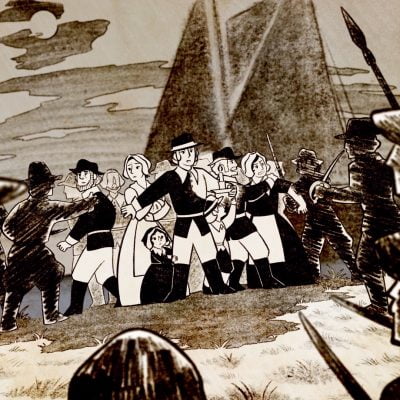
Sixty miles to the coast: attempting to flee from Boston
Once the Separatists made their minds up about fleeing from England in search of tolerance in Holland, they needed to find a means of escape. They were living inland, in Nottinghamshire and around Gainsborough, so they needed to make their way to the coast.
Pilgrim chronicler William Bradford later recalled the turmoil that many of them faced, in deciding what to do – whether to stay or leave, and by going, having to leave everything behind – their jobs and homes and people they knew. They also knew they’d be travelling to a land where they didn’t speak the language:
“Being thus constrained to leave their native soil and country, their lands & livings, and all their friends & familiar acquaintances, it was much … But to go into a country they knew not (but by hearsay), where they must learn a new language, and get their livings they knew not how, it being a dear place, & subject to the miseries of war, it was by many thought an adventure almost desperate, a case intolerable, & a misery worse than death …
They were not acquainted with trades … but had only been used to a plain country life, & the innocent trade of husbandry [farming]. But these things did not dismay them (though they did sometimes trouble them) for their desires were set on the ways of God … but they rested on his providence”
Making an escape was easier said than done – these were families with young children – and without permission, no one was allowed to leave the country, so they had to do it illegally.
“The ports and havens were shut against them, so as they [had] to seek secret means of [escape] & … bribe … the mariners, & give extraordinary rates for their passages. And yet were they often times betrayed (many of them), and both they & their goods intercepted & surprised, and thereby put to great trouble & charge”
Their first attempt was made at Boston, in the autumn of 1607. They made their way there and were taken at night to a ship. The crew loaded their belongings on board, but then betrayed them.
“There was a large company of them purposed to get passage at Boston in Lincolnshire, and for that end had hired a ship wholly to themselves, & made agreement with the master [the ship’s captain] to be ready at a certain day, and take them and their goods in, at a convenient place, where they accordingly would all attend in readiness.
So after long waiting, & large expenses … he came at length & took them in, in the night. But when he had them & their goods aboard, he betrayed them, having beforehand [plotted] with the searchers & other officers so to do; who took them, and put them into open boats, & there rifled & ransacked them, searching them to their shirts for money … even the women further than became modesty; and then carried them back into the town, & made them a spectacle & wonder to the multitude, which came flocking on all sides to behold them”.
The intriguing story of the Pilgrims’ time in Boston is closely connected to Boston Guildhall, where they were taken after their failed first attempt to escape.
Next week: Arrest – the Pilgrims are held in Boston – what will happen now?


